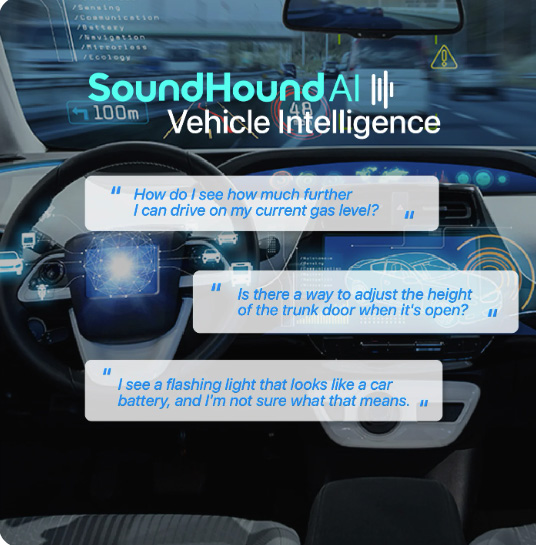Automakers face a choice: adopt consumer tech AI or embrace specialized automotive AI. Each path will shape the future of in-car experiences.
By: Pedram Faghfouri, Senior Director of Product – Automotive & IoT, SoundHound AI
AI and voice technology is becoming standard in the automotive industry – and competition is heating up for those looking to stay ahead of the curve. Apple’s decision to incorporate ChatGPT and advanced voice AI into CarPlay signals a major shift in how tech giants view the car as an extension of our digital lives. Yet this move also brings into sharp focus the specialized nature of automotive AI, a domain where my company, SoundHound AI, has been quietly innovating for nearly a decade.
The announcement of Apple Intelligence,at the company’s June 2024 Worldwide Developers Conference reflects a major advance in how iPhone and iPad users interact with their devices. By combining the power of generative AI models with an update to Siri’s voice capabilities, Apple intends that its AI-powered system will intelligently access and utilize information across apps and services on each user’s device in ways not previously possible.
Apple has always excelled at bringing innovative technologies to a large consumer audience – such as the iPhone, streaming music, and map guidance, to name only a few. The company could similarly make generative AI-enabled voice technology as widely accepted by consumers and as easy to use as Apple’s previous successes.
But we see a different dynamic playing out in the automotive industry.
While Apple CarPlay has enabled consumers to bring iPhone functionality to the vehicle, CarPlay has remained separate from the main head unit of the car. Streaming music and map navigation are one thing; controlling car functions is something else entirely.
Although Apple undoubtedly wants its updated CarPlay to take over more screens, including a car’s instrument cluster, and features like the radio and air conditioning system, automakers are resistant for many reasons.
The new breed of in-vehicle AI-powered voice assistants with integrated generative AI present a much more challenging environment than anything CarPlay has encountered so far.
For example, robust connectivity – a requisite for AI – is something that becomes problematic as cars travel through areas that force them offline. Additionally, specialist work is needed to tackle environmental noise, scenarios with multiple users, deeper vehicle integration with nuanced automotive systems, and real-time responses that must outperform consumer-grade AI assistants.
And this is all while considering that, for automakers, any AI assistant needs to reflect brand values and offer customization options to maintain brand identity.
Internal feedback from automakers that have experience working alongside big tech has revealed that these companies do not prioritize the customization needs of automakers. And yet it is essential for each OEM’s voice UI to be an extension of their branding and positioning.
Perhaps even more importantly, automakers are understandably resistant to relinquish control over their customer data. This valuable data allows automakers to build and maintain stronger relationships with their customers and gives them an edge over competitors by better understanding and serving their market. Customer data is vital for innovation, evolution, and growth.
And with deep concerns around data privacy, many automakers are loath to jeopardize their customer relationships, especially since many buyers — particularly in Europe — dislike having their personal data shared with big tech companies, which are inevitably shared with other unknown third parties.

For the unconvinced I should be clear: this technology is a prize worth having for OEMs.
SoundHound AI launched the first voice assistant with integrated generative AI in the world last year. It’s now live and on the roads across five brands in 18 countries, and our initial data is eye-opening. Across these brands, and among others we’re testing with, we’re seeing as much as a 6X increase in assistant usage. This opens up incredible possibilities for automakers – from stronger consumer-brand relations to monetization, the opportunities are increasingly valuable.
Our smart engineers have also developed a proprietary new approach that allows the system to avoid the kind of misleading and unpredictable responses now associated with some LLMs. Known as ‘AI hallucinations’, they are an inherent risk that can result from technology that relies exclusively on generative AI.
While Apple’s integration of ChatGPT and advanced voice AI into CarPlay represents a significant leap forward in consumer technology, as the industry evolves, the choice between consumer-oriented tech giants and specialized automotive AI providers will become critical. Ultimately, it will likely shape the future of in-car experiences, determining how automakers navigate the delicate balance between technological advancement and brand autonomy in the age of intelligent vehicles.

Pedram Faghfouri is a passionate product leader at the interface of software and hardware, and has a strong background in automotive, professional audio, and B2B SaaS. He currently leads Product Management globally for the Automotive & IoT division at NASDAQ-listed Silicon Valley company SoundHound AI. Beyond his work, he finds excitement in all things music tech, innovative tech gadgets, and playing tennis.
Scott Ellyson, CEO of East West Manufacturing, brings decades of global manufacturing and supply chain leadership to the conversation. In this episode, he shares practical insights on scaling operations, navigating complexity, and building resilient manufacturing networks in an increasingly connected world.